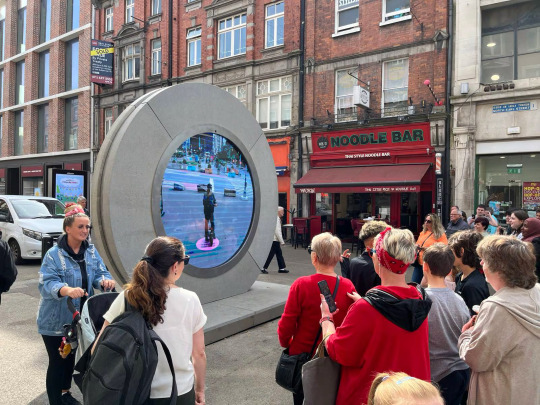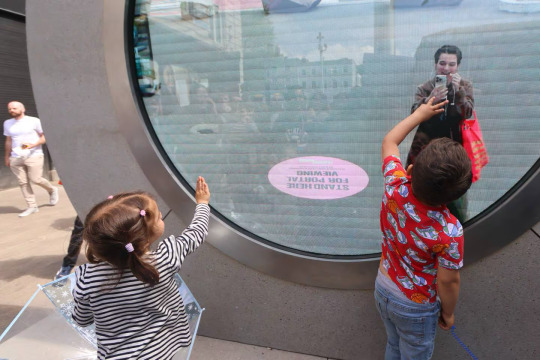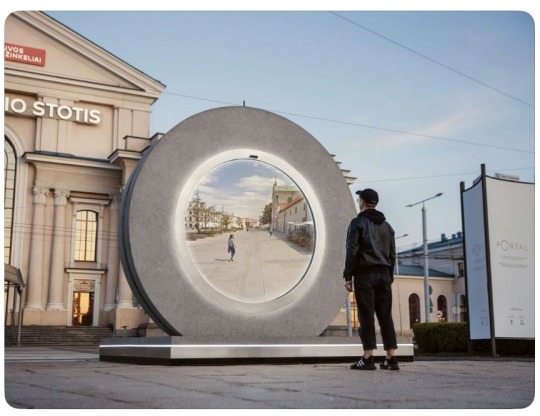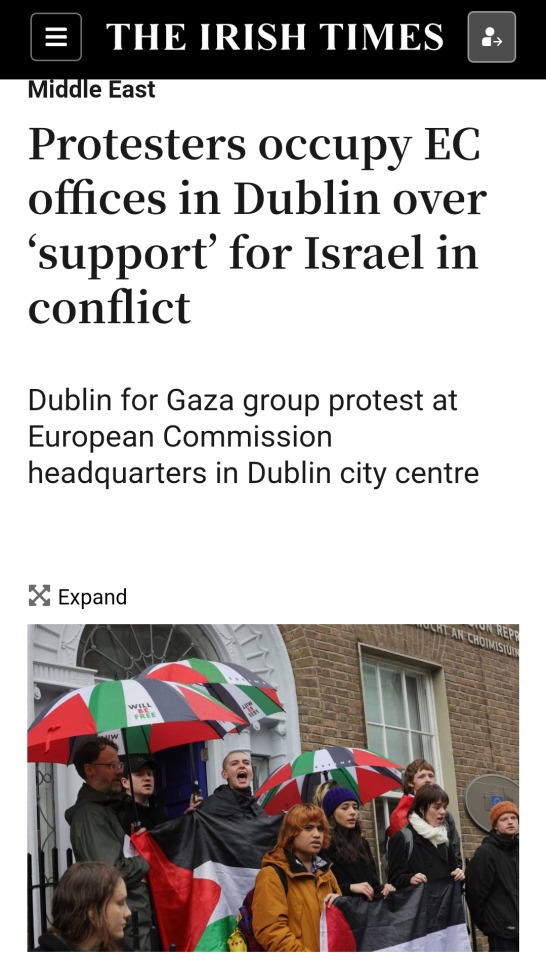#The Irish Times
Explore tagged Tumblr posts
Text

Ohhh ya little bollocks, picked the wrong fucking one
Israel's BIG MAD Ireland isn't fucking bowing to them right now. Thanks to their shit, Paddy Cosgrave and President Michael D Higgins seem to be the biggest villains in Ireland right now.
So one of their 'diplomats' decided to fuck around and got caught. How many inflammatory Tweets filled with accusation and lies have genocide advocates had to delete these last 2 weeks?
EXPEL THE ISRAELI AMBASSADOR.
IRELAND STANDS WITH PALESTINE.
🇵🇸✊🇮🇪
From the article:
"Adi Ophir Maoz, the deputy head of mission in Dublin, stated: “#Ireland Wondering who funded those tunnels of terror? A short investigation direction - 1. Find a mirror 2. Direct it to yourself 3. Voilà”"
Source: @IrishTimes on Twitter
Link to the full:
#free gaza#gaza strip#irish solidarity with palestine#free palestine#palestine#gaza#news on gaza#boycott israel#israel#The Irish Times#Israeli Embassy#Israeli diplomat#Irish#Proud to be Irish#Irish pride#Éire
4K notes
·
View notes
Text

Robert Smith, The Irish Times, 2024
75 notes
·
View notes
Text


[Photos by Fran Veale]
28 notes
·
View notes
Text

From today's Irish Times - 'The Hares of Lettergesh West' by Theodore Deppe...
10 notes
·
View notes
Text

8 notes
·
View notes
Text
#OTD in 1976 – Tens of thousands defied a ban on commemorating the heroes of Easter 1916 at the GPO in Dublin.
In 1976, the 60th anniversary of the Rising, the southern state and the republican paramilitaries – particularly the Provisional IRA were in frank confrontation. The Irish government banned that year’s proposed Easter parade by republicans under the Offences Against the State Act – its anti-terrorist legislation. Just ten years after the state’s own bombastic commemoration of the Rising in 1966,…

View On WordPress
#1916 Easter Rising#60th Anniversary#Dublin#GPO#History#History of Ireland#Ireland#Irish History#O&039;Connell Street#Offences Against the State Act#Provisional Irish Republican Army#Stephen’s Green#The Irish Times
11 notes
·
View notes
Text

Domhnall Gleeson for The Irish Times
📷 Bryan O’Brien (29.04.2014)
24 notes
·
View notes
Link
It’s 11am in Dublin and about 30 people on North Earl Street are vigorously waving at a man on an escooter in New York, who stares back at them with a look on his face that suggests he’s not entirely sure what’s going on.
The two cities have just been linked up via a 24-hour live stream as part of the Portals art project. The large circular screen in the middle of the north Dublin street provides a window to the Flatiron South Public Plaza at Broadway (and vice versa) and will remain in place until the autumn.
“They can see us, and we can see what’s going on there,” said one passerby to her friend on Thursday morning.
The Portal is the idea of Lithuanian artist Benediktas Gylys and is a collaboration between several bodies, including Dublin City Council and the EU Capital of Smart Tourism. The project will feature scheduled programming, including cultural performances at each city’s Portal. These will start in mid-May, with a visual program to celebrate New York Design Week Festival.


Portal also available between Vilnius, Lithuania and Lublin, Poland


5 notes
·
View notes
Text


📸: Lorenzo Agius for The Irish Times
20 notes
·
View notes
Text

"It was liberating to get out a little early on Game of Thrones"
x
22 notes
·
View notes
Text

― Amy Winehouse, in a interview with The Irish Times, December 2006.
13 notes
·
View notes
Text

BASED IRELAND OUT SUPPORTING PALESTINE BY OCCUPYING THE EC OFFICES IN DUBLIN
🇵🇸💜🇮🇪
#free gaza#gaza strip#irish solidarity with palestine#free palestine#palestine#gaza#news on gaza#boycott israel#israel#The Irish Times#european commission#European Union#EU#Ireland#Irish#Irish pride#Proud to be Irish#Irish tumblr#Ireland tumblr
409 notes
·
View notes
Text

Robert Smith, The Irish Times, 2024
51 notes
·
View notes
Text
3 notes
·
View notes
Text
#OTD in 1803 – Birth of William Smith O’Brien in Dromoland, Newmarket on Fergus, Co Clare.
William Smith O’Brien was a Protestant Irish nationalist Member of Parliament (MP) and leader of the Young Ireland movement. He also encouraged the use of the Irish language. He was convicted of sedition for his part in the Young Irelander Rebellion of 1848, but his sentence of death was commuted to deportation to Van Diemen’s Land. In 1854, he was released on the condition of exile from Ireland,…

View On WordPress
#Co. Clare#Dromoland#England#History of Ireland#Ireland#Irish History#Newmarket-on-Fergus#Sedition#The Irish Times#Van Diemen&039;s Land#William Smith O&039;Brien#Young Ireland Rebellion of 1848
3 notes
·
View notes
Text
From war hero to war crimes
In a hotel room in Soho, the American historian Peter Kuznick starts telling me about the origins of his and Oliver Stone's television series, The Untold History of the United States . Stone himself, tired after a day of interviews, is pottering around the room, asking the PR questions about the previous journalists, ducking out to the bathroom. Later, he wanders over to his PA to request some chocolate.
“I was teaching a class called Oliver Stone’s America,” says Kuznick, which seems to be Stone’s cue to sit down.
“That’s me,” he booms. Over the course of the interview he controls the flow of conversation but regularly passes questions to his collaborator when he feels Kuznick has a better handle on the subject – “Peter, tell Patrick about . . . ” he’ll say.
"I've been using Oliver's films to structure a history class since 1996," continues Kuznick. "We've been talking about politics ever since. In 2007, we were sitting down for dinner and he said 'Peter let's do it. Let's do an hour-long documentary about the origins of the cold war and [left-leaning US vice-president] Henry Wallace and the bomb.' When I saw him two week later, it was a 10-hour series."
Using Stone's films to structure a history course makes sense, particularly if you come from the left. No matter what the subject, a more shadowy, manipulative US emerges from his work: war (Platoon ); foreign policy (Salvador); media (Natural Born Killers); economics (Wall Street ; politics (JFK, Nixon, W); or the war on drugs (Savages). Oliver Stone's America is startlingly at odds with the nation's heroic self-image.
"I would admit that that's true," says Stone and laughs. The Untold History of the United States argues, through narration by Stone, that the USSR rather than the US beat the Nazis – "Britain and America fought 10 German divisions combined in that war; the USSR fought 200 German divisions," says Kuznick – that it was unnecessary to drop the atomic bombs on Japan, and that since the war, America has been a trouble-making busy-body.
Controversial as some of this might be to Americans, Stone agrees that these aren't exactly "untold" views and they're certainly not surprising for Europeans. "I grew up a little bit in Europe in the 1950s because my mother is French," he says. "They always criticised America as a rich country. Then Vietnam was a huge issue in Europe, and during the Iraq war there was huge protest in Europe. In America, France and Germany were dismissed as old Europe. French fries had to be changed to 'freedom fries'.
“The attitude was that old Europe was always cranky and always critical of the US and that we would have to act alone. That’s what gave Bush the sense of empowerment, that entitlement that we don’t need anybody, that we can do it by ourselves. Your prime minister unfortunately was Bush’s puppy dog,” he adds.
I point out that Tony Blair wasn’t my prime minister, but Stone doesn’t hear me.
“If Blair had held out and gone the other way with Bush it might have made more of a dent,” he says and shakes his head sadly. “And what’s going on now in Europe? Have you become deadened to the American use of force around the world? Have you in some way given up, tired of fighting this beast for years, just content they won’t start World War III? There’s this resignation that comes over the older person who says ‘well, the US, if it weren’t them it would be somebody worse’.”
Stone’s own politics have not been made gentle by age, but he didn’t start out as a radical. “I was born conservative, a Republican,” he says. “My father was a colonel in the war. I served in Vietnam and my French grandfather was in the French army. I believed in fighting communism. I wasn’t radicalised by the war. I came home numbed. It took another 10 years of evolution to get to a place where I went to Central America and saw that what was going on was wrong. American troops were there. It was Vietnam redux.
"That's when I made Salvador [set during the Salvadorian civil war]. There's a speech by Jimmy Woods to the military attaché saying, 'Why are you going around the world making these Frankenstein monsters? You give us these dictators, these death squads, these mad men who in the name of capitalism and free markets destroy their fellow citizens.' "
So the scales fell off your eyes? "It started after Vietnam," he says, "the scales coming off the eyes. Watergate was certainly powerful. As were the Church Committee hearings revealing the CIA black ops all over the world, those interventions we didn't know about but always suspected. By Salvador , I was committed to making a more progressive kind of film."
He talks about Richard Boyle, the photojournalist, cowriter and subject of Salvador , "a fiery Irish man who took the scales off my eyes about Central America. He'd been to Cambodia and Vietnam. He was as crazy as they come, always looking for trouble spots. Jimmy Woods caught only about three quarters of how crazy he was – the kind of madness that drives the world, willing to sacrifice his life again and again. He had a crazy Irish attitude."
Stone looks at me apologetically (he now realises I’m Irish). “Maybe I’m being clichéd, but I saw him take on men three times his size in a knuckle fight. He’d make big men cry.”
Stone likes heroic outliers. The hero in early episodes of the Untold History is Henry Wallace, the left leaning vice-president who wanted the 20th century to be "the century of the common man".
Wallace would have succeeded Roosevelt had he not been ousted in favour of Truman as vice-president towards the end of the war. Stone and Kuznick maintain that this is a key moment. Wallace’s America, they suggest, would have been more egalitarian and less militarised. It would not have dropped the bomb on Japan, and would have adopted a more conciliatory attitude towards the USSR.
“I’d like to have lived in Wallace’s America,” says Stone. “Most people wanted Wallace back as vice-president. The coup happened among the Democratic party bosses. It’s an instance where mass movements didn’t work. The atomic bomb is another instance. People did not vote on the atomic bomb. On the other hand, the New Deal is something people voted on.”
Kuznick and Stone are fans of popular, democratic, ground-up movements and hope that in some small way their series might inspire some new ones. "I want to make history come alive for our young people," says Stone. "History is fascinating but they get bored with it. And the reason I think they get bored with it, in America anyway, is they hear the same narrative over and over and don't believe it. It's a Disney world kind of bullshit. If you let more of a horror story come out, it's juicier and I think the kids go 'Yeah, I believe we did that'. I think we have to admit to the horror and terror we bring to the rest of the world, to the peasants of Central America or to the peasants of Indonesia. "
“When people do admit it, it’s as an isolated incident, an aberration,” says Kuznick, tapping the table gently. “Not a recurrent pattern.”
“The atomic bomb is a crucial founding myth in the US,” says Stone. “Once you have that muscle, you never give it up. Unfortunately, it gave us a great sense of self-love. Might became right so everything we did was judged as right and good. We enacted a morality code for ourselves that made us exempt from criminal behaviour. The Iraq war was universally trashed as an illegal, useless war, but even US liberals just see it as a mistake. ‘Bush lied to us.’ Well I think we really did something evil there. We took a whole society and rendered it. Americans don’t know the effects of what they do. [Former secretary of defence] Robert McNamara was stunned in the 1990s to hear that 3.8 million had died in Vietnam; he always thought it was a lesser figure. Peter asks his classes how many Vietnamese died in Vietnam.”
“Some of them guess as low as 10,0000,” says Kuznick.
"People don't know," says Stone. "There's a walking away from things that only the atomic bomb allows you to do. Because you have the might, you don't have to feel bad or pay for your sins."
In this regard, Untold History is an important corrective. Sometimes, however, it seems to suggest that nefarious US foreign policy might be equivalent to Soviet repression and mass murder (they stress extenuating circumstances for some Soviet atrocities). They respond to this allegation wearily.
"We portray Stalin as a tyrant," says Kuznick. "We don't pull our punches that Stalin was a tyrant. But he's the tyrant who saved Britain. We'd be speaking German here today if not for the Soviet Union. "
“Stalin was the bogeyman that allowed the US to arm itself and militarise the globe,” says Stone, before turning to his PA. “We’re getting locked into the Soviet issue because the journalists have only been sent the first two chapters.” (For the record, I’d watched the first six chapters.) “Earlier someone called it 1950s propaganda.”
Stone is a little annoyed, perhaps understandably. He has spent five years making this series but further years thinking about it. "For me this is a lifetime's work," says Stone. "It's the culmination of all the films. Go back and watch them and you'll see."
-Patrick Freyne, "From war hero to war crimes," The Irish Times, Apr 17 2013
0 notes